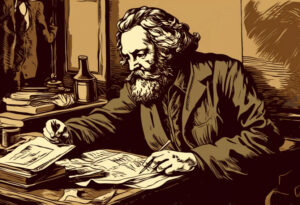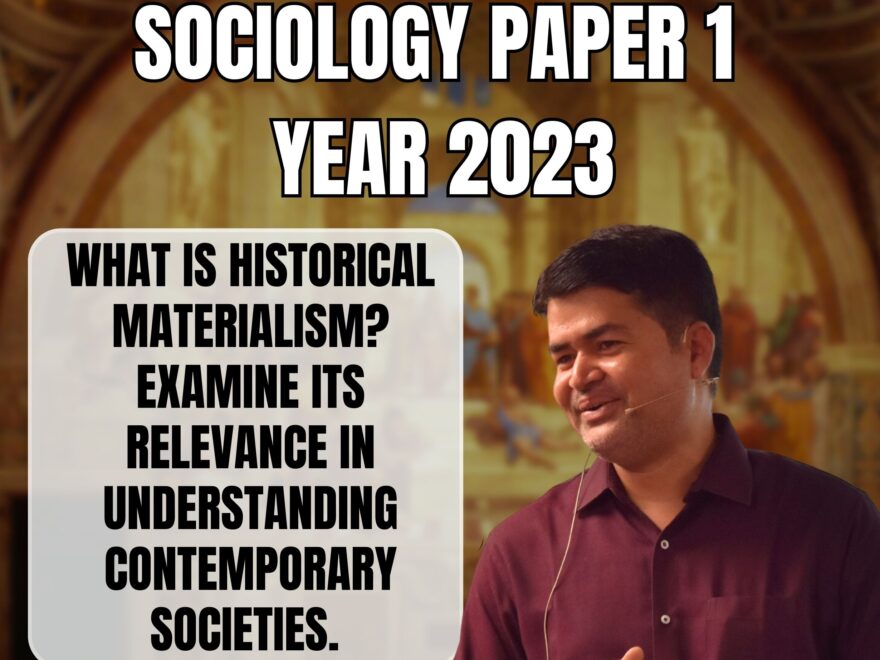What is historical materialism? Examine its relevance in understanding contemporary societies.
Section: A.
Sociology Paper 2023 Analysis.
Relevant for Paper 1: Unit-4 Sociological Thinkers

Question 2 (A): What is historical materialism? Examine its relevance in understanding contemporary societies.
(20 Marks)
|
Introduction: Brief Background About the Idea of “Dialectical Idealism” of Hegel and the “Concept of Materialism” by Ludwig Feuerbach. Main Body: Explanation of Historical Materialism ,Relevance of Idea. Conclusion: Relevance of Multidimensional Analysis of Social Reality. |
Introduction:
Marx’s idea of historical materialism was influenced by the idea of “dialectical idealism” of Hegel and the “concept of materialism” by Ludwig Feuerbach. Where Hegel explained the evolution of history by dialectics between thesis and antithesis. Ludwig Feuerbach said that the changes in society are due to materialistic condition changes . These changes take place in an orderly manner . Karl Marx, influenced by both, gave the idea of dialectical materialism or historical materialism.
Main body:
- Historical materialism can be simply explained as materialistic interpretation of history. It attempts to explain the evolution of society from the simple, undifferentiated and egalitarian Primitive communism stage to the complex, differentiated and highly unequal Capitalistic stage through change in mode of production ( material conditions).
- He understood the historical evolution process in terms of a dialectics process , where existing relations of productions come in conflict with new forces of production .
- As Marx observed: “In the social production of their life men enter into definite relations that are indispensable and independent of their will, relations of production which correspond to a definite stage of development of their material productive forces. The sum total of these relations of production constitutes the economic structure, the real basis on which rises a legal and political superstructure.”
- According to this interpretation, mode of production in a given society constitutes its’ ‘base’; legal and political institutions, religion and morals, etc. constitute its ‘superstructure’ which are shaped according to the changing character of the base.
- Marx’s sas that “at a certain stage of their development, the material productive forces of society come in conflict with the existing relations of production … within which they have been at work hitherto; Then begins an epoch of social revolution.”
- Man’s constant search for improvement of production (with a view to overcoming scarcity, etc.) leads to the development of forces of production. Means of production are improved by scientific discoveries and invention of new techniques and implements while labour power’s developed by the acquisition of new knowledge, education and training.
- The development of the forces of production leads to a contradiction between the forces of production and relations of production. The intensification of this contradiction ushers in a stage when the existing relations of production are no longer compatible with the level of development of forces of production. Its result is the breakdown of the existing mode of production and its superstructure.
- Thus, for example with the rise of industrialization in the sphere of forces of production, the pre-existing feudal system in the sphere of relations of production (that is, division of society into lords and serfs) is bound to collapse which is now replaced by a new capitalist mode of production.
Relevance in understanding contemporary society
- The caste system in India, historically linked with occupational roles, can be understood as a superstructure that emerged from the feudal agrarian base, where certain castes dominated the means of production.
- Changes in economic policy such as LPG reform brought broad-based change in Indian society. Secularisation of marriage, caste etc , consumerism, legal rationality, emergence of New middle class etc are result of these economic changes. Thus, material change brings change in contemporary society as well.
- Due to Neo- liberalism and globalisation, inequality increased in the society. These changes in the economic sphere cause conflict in society. Which is reflected in the rise of Right wing populism and de- globalisation tendencies such as BREXIT & Make America Great Again. Thus changes in material conditions influence the political and social sphere as well.
- Historical materialism’s focus on class relations and conflicts provides a useful lens to understand contemporary societies. The widening income gap, labour exploitation, and economic inequality prevalent in many societies today can be analysed through this perspective.
- Likewise, the Naxalite movement in India, emerging from land disputes in Naxalbari, West Bengal, exemplifies the idea of class conflict against prevailing land-owning elites.
- The critique of capitalism offered by historical materialism remains relevant. The inherent contradictions and crises of capitalism, such as economic recessions, unemployment, and environmental degradation, are still significant issues in contemporary societies.
- Historical materialism can help understand the dynamics of globalisation and neo-imperialism. The spread of capitalism worldwide, the dominance of multinational corporations, and the economic exploitation of developing countries can be analysed through this perspective.
Conclusion:
While historical materialism offers valuable insights into the functioning of societies, it should not be applied dogmatically. It needs to be combined with other sociological theories and perspectives to fully understand the complexities of contemporary societies. For instance, Weber’s emphasis on ideas and values, and Durkheim’s focus on social solidarity and collective conscience, provide a more comprehensive understanding when used in conjunction with historical materialism.
Related Blogs…
 |
 |

To master these intricacies and fare well in the Sociology Optional Syllabus, aspiring sociologists might benefit from guidance by the Best Sociology Optional Teacher and participation in the Best Sociology Optional Coaching. These avenues provide comprehensive assistance, ensuring a solid understanding of sociology’s diverse methodologies and techniques.
META TAGS:
Iron Law of Oligarchy, Robert Michels, Vilfredo Pareto, Lions and Foxes theory, power dynamics, organizational oligarchy, elite circulation, political sociology, leadership styles, organizational control, sociological theories, political maneuvering, elite differentiation, power concentration, societal stability, political leadership, strategic political leadership, Sociology Question Paper, Sociology Question Paper 2023, Sociology Question Paper CYQ, Sociology Question Paper UPSC, What, according to Robert Michels, is the iron law of oligarchy? Do lions and foxes in Vilfredo Pareto’s theory, essentially differ from each other? Substantiate.
Why Vikash Ranjan’s Classes for Sociology?
Proper guidance and assistance are required to learn the skill of interlinking current happenings with the conventional topics. VIKASH RANJAN SIR at TRIUMPH IAS guides students according to the Recent Trends of UPSC, making him the Best Sociology Teacher for Sociology Optional UPSC.
At Triumph IAS, the Best Sociology Optional Coaching platform, we not only provide the best study material and applied classes for Sociology for IAS but also conduct regular assignments and class tests to assess candidates’ writing skills and understanding of the subject.
Choose The Best Sociology Optional Teacher for IAS Preparation?
At the beginning of the journey for Civil Services Examination preparation, many students face a pivotal decision – selecting their optional subject. Questions such as “which optional subject is the best?” and “which optional subject is the most scoring?” frequently come to mind. Choosing the right optional subject, like choosing the best sociology optional teacher, is a subjective yet vital step that requires a thoughtful decision based on facts. A misstep in this crucial decision can indeed prove disastrous.
Ever since the exam pattern was revamped in 2013, the UPSC has eliminated the need for a second optional subject. Now, candidates have to choose only one optional subject for the UPSC Mains, which has two papers of 250 marks each. One of the compelling choices for many has been the sociology optional. However, it’s strongly advised to decide on your optional subject for mains well ahead of time to get sufficient time to complete the syllabus. After all, most students score similarly in General Studies Papers; it’s the score in the optional subject & essay that contributes significantly to the final selection.
“A sound strategy does not rely solely on the popular
Opinion of toppers or famous YouTubers cum teachers.”
It requires understanding one’s ability, interest, and the relevance of the subject, not just for the exam but also for life in general. Hence, when selecting the best sociology teacher, one must consider the usefulness of sociology optional coaching in General Studies, Essay, and Personality Test.
The choice of the optional subject should be based on objective criteria, such as the nature, scope, and size of the syllabus, uniformity and stability in the question pattern, relevance of the syllabic content in daily life in society, and the availability of study material and guidance. For example, choosing the best sociology optional coaching can ensure access to top-quality study materials and experienced teachers. Always remember, the approach of the UPSC optional subject differs from your academic studies of subjects. Therefore, before settling for sociology optional, you need to analyze the syllabus, previous years’ pattern, subject requirements (be it ideal, visionary, numerical, conceptual theoretical), and your comfort level with the subject.
This decision marks a critical point in your UPSC – CSE journey, potentially determining your success in a career in IAS/Civil Services. Therefore, it’s crucial to choose wisely, whether it’s the optional subject or the best sociology optional teacher. Always base your decision on accurate facts, and never let your emotional biases guide your choices. After all, the search for the best sociology optional coaching is about finding the perfect fit for your unique academic needs and aspirations.
Follow us :



Find More Blogs…
| Compare and contrast Karl Marx’s and Max weber’s | Karl Marx- Historical Materialism |
| Position of Women In the Modern Indian Society | Sociology: Social system and pattern variables |




2 comments